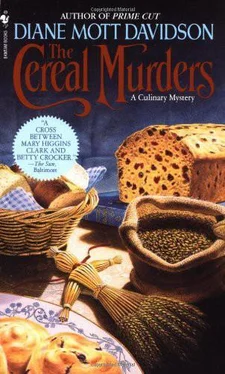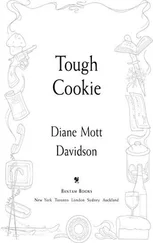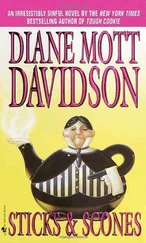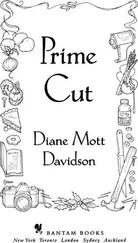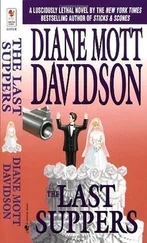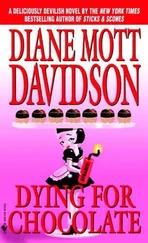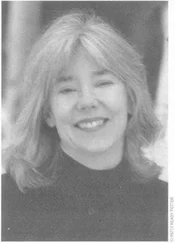The voices of Julian, Macguire, and the headmaster warbled uncertainly out of the kitchen. Then the headmaster cried, “Keith Andrews? Dead? Are you sure? Oh, nor I heard footsteps moving rapidly up the kitchen staircase. I stood staring into the living room, where the recent exodus of guests had left the tables and chairs helter-skelter.
“What are you doing in here? Jeez, Goldy.” Julian leaned in toward my face. “You look even worse than you did five minutes ago.”
There was a buzzing in my ears.
“Did you get through to Arch?” I wanted to know.
Julian nodded. “And?”
“He’s fine… . There was a problem with the security system a little while ago.”
“Excuse me?”
“Somebody threw a rock through one of the upstairs windows. It hit one of the sensor wires, I guess. The system went off. Once Arch found the rock, he interrupted the automatic dial.”
I tried to breathe. There was stinging behind my eyes. I had to get home. I said, “Can you find something to put on? We need to go outside… to be there when they arrive.”
He withdrew without a word. I went into the bathroom and stared at my face in the tiny mirror.
I was not a stranger to death. The previous spring I had seen a friend die in a car accident that had been no accident. I began to wash my hands vigorously. Nor was I a stranger to violence. I tested my thumb, the one my ex-husband, Dr. John Richard Korman, had broken in three places before we were divorced. Trying to bend it, I winced. The warm water stung my hands like needles.
In the mirror, my skin looked gray, my lips pale as dust. A problem with the security system. I shook droplets off my hands. My right shoulder ached suddenly. In the middle of an argument, John Richard had pushed me onto the open lower shelf of the dishwasher. A butcher knife had cut deeply into the area behind that shoulder, and I had paid for my protest over his extramarital flings with twenty stitches, weeks of pain, and a permanent scar.
Now death, violence, brought it all close again. I looked down at my trembling hands. They had touched the cold, stiff cord wrapped around Keith Andrews’ body. The water ran and splashed over my fingers, but it could not wash out the slimy feel of the wire. I thought of Keith Andrews’ angelic expression. Saint Andrews. I had stared into his lifeless face… how like Arch he had looked, thin and pale and vulnerable… . What had Keith said? [‘m learning to focus on the process rather than the outcome. Not anymore.
There was a knock at the door: Julian. Was I okay? I said yes, then splashed water on my eyes, picked up an embroidered guest towel, and rubbed the flimsy thing against my hands and cheeks until they shone red.
When I came out, Macguire called down that he and his father would be outside in a minute. I wrapped the raccoon monstrosity around my body. Together Julian and I trudged back through the deep snow to wait in silence next to one of the outdoor carriage lanterns, a respectful ten feet away from the corpse of Keith Andrews.
Tom Schulz was the first to arrive from the Furman County Sheriff’s Department. When his dark Chrysler chopped through the snowy parking lot, his headlights sent a wave of light bouncing through the cluster of pines next to the old house. There was another car directly behind his; the two vehicles stopped abruptly, spraying snow. The Chrysler’s door creaked open and Tom Schulz heaved his large body out. Coatless, he slammed the door and crunched across the frozen yard. Finally.
Two men got out of the second car; one joined Schulz. The other man came over to Julian and me. He introduced himself as part of the investigative team.
“We need to know about footprints,” he said. He looked down at my shoes. “Were you the only one to go out to the victim?”
I told him two other people had been out there. He shook his head grimly and asked which way we had gone through the snow. I showed him. He turned and pointed out a large arc around our path for the other men to take.
Schulz and the man I assumed was a paramedic approached the body. They bent over it, murmured back and forth, then Schulz walked raggedly back and reached for the cellular phone. His voice crackled through the cold air, although I couldn’t make out any of the words. The other men stationed themselves near the corpse, sentrylike, ignoring us. Julian and I stood, mute and miserable, our arms clasping our bodies against the deep cold.
Schulz walked over. He stopped and pulled me in for a mountain-man hug. He murmured, “You all right?” When I nodded into his shoulder, he said, “You want to tell me what happened?”
I pulled back to look at him, the man who had invaded my life a year earlier and stubbornly would not leave. Golden lantern light illuminated the large, unpretentiously handsome face that was now somber and grim. His serious mouth, his narrowed eyes with their tentlike bushy brown eyebrows-these showed willed control in the midst of chaos. His faded jeans, white frayed-collar shirt, and sweater the color of cornflowers indicated he’d been relaxing at something before the call came in. Now Schulz pulled himself up, his stance of command. “What happened here, Goldy?” he repeated crisply. I’m in charge here now.
“I don’t know,” I said. “I saw the sled when I was loading the van, and then I saw the coat, so I went over… Schulz’s sigh sent a cloud of steam between us. Behind us, three more police and fire vehicles drove up. He reached out and pulled the fur collar snugly around my throat.
“Let’s go in. That’s quite a getup. The two of you. I swear. Come on, big J.,” Schulz said to Julian as he put one arm around him. Behind us, strobe flashes went off like lightning. “Be lucky if pneumonia doesn’t take you both. Honestly.” Another deputy silently joined us. Schulz and the other policeman walked with Julian up the narrow path that skirted the pines and led to the big stone house. I followed, clumsily trying to step in their footsteps.
The headmaster was tripping down the carpeted front stairs when we pushed through to the house’s elegant entryway. The upturned collar of Alfred Perkins’ black trench coat framed his horrified eyes behind round hornrimmed glasses. Above his high forehead, the cottony mass of white hair was wildly askew. His boot buckles clickety-clacked as he marched across the foyer toward us. When Schulz identified himself, the headmaster demanded: “Is there any way we can keep this out of the papers?”
Schulz raised both eyebrows and ignored the question. Instead, he said, “I need some information about next of kin so we can get back to the coroner. Can you help me out?” The headmaster gave the names of Keith’s parents, who were apparently in Europe. The deputy wrote the names on a pad, then disappeared. Schulz started his characteristic swagger down the hallway, poking his head through each doorway. When he found a room he liked, he beckoned with a thumb to Perkins.
“Headmaster, sir,” he said with a deference that fooled nobody, “would you wait in here; until I have a chance to talk to you?” When the headmaster nodded numbly, Schulz added, “And don’t talk to anyone, please, sir. Press or otherwise.”
The headmaster clomped to his assigned spot. Schulz closed the heavy door behind him, then turned and asked who else was around. Julian called to Macguire, who trundled in and was assigned to another room. Perkins’ son looked deeply stunned. In a kinder tone Schulz asked Julian to sit in the living room until he’d finished talking to me. “And try not to disturb anything,” he added. “But get yourself a blanket to warm up.”
Julian’s face had a lost look that tugged at my heart. He obeyed Schulz in silence. But as we headed down to the kitchen, I heard him choke on exhaled breath.
Читать дальше
